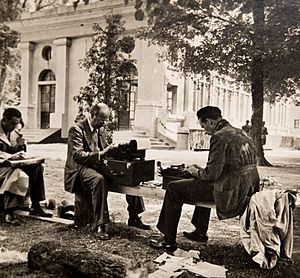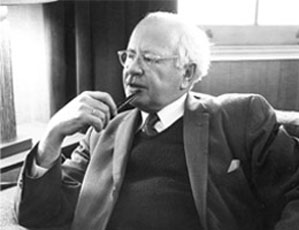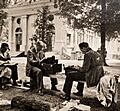William L. Shirer facts for kids
William Lawrence Shirer (February 23, 1904 – December 28, 1993) was an American journalist and war reporter. He is famous for writing The Rise and Fall of the Third Reich. This book is a detailed history of Nazi Germany. It has been read by many people for over 50 years.
Shirer started as a foreign reporter for newspapers like the Chicago Tribune. Later, he was the first reporter hired by Edward R. Murrow for CBS radio. They became part of a group of journalists called "Murrow's Boys". Shirer was well-known for his live reports from Berlin. He reported on the rise of the Nazi government and the first year of World War II. He and Murrow also created the first broadcast world news roundup. This way of sharing news is still used today.
Besides The Rise and Fall of the Third Reich, Shirer wrote many other books. These include Berlin Diary (1941) and The Collapse of the Third Republic (1969). He also wrote a three-part autobiography called 20th Century Journey.
Contents
Early Life and Career
William Shirer was born in Chicago in 1904. He went to high school and college in Cedar Rapids, Iowa. After graduating in 1925, he traveled to Europe. He worked his way there on a cattle boat. He ended up staying in Europe for 15 years.
From 1925 to 1932, he worked for the Chicago Tribune. He reported from Europe, the Near East, and India. In India, he became friends with Mahatma Gandhi. Shirer lived and worked in France for several years. He also lived in Nazi Germany from 1934 to 1940.
In 1931, Shirer married Theresa Stiberitz, a photographer. They had two daughters, Eileen and Linda. They later divorced in 1970. He married Martha Pelton in 1972, and they divorced in 1975. His last marriage was to Irina Lugovskaya. Shirer lived in Lenox, Massachusetts when he passed away.
Reporting Before the War
As a journalist, Shirer reported on the growing power of the Nazi party in Germany. This began in 1933. He covered important events like the return of the Saarland to Germany. He also reported on the remilitarization of the Rhineland.
In 1934, Shirer joined the Berlin office of Universal Service. This was a news agency owned by William Randolph Hearst. When Universal Service closed in 1937, Shirer was briefly laid off.
Soon after, Edward R. Murrow contacted Shirer. Murrow was the European manager for CBS. He needed an experienced reporter to open a CBS office in Europe. Murrow offered Shirer a job. Shirer was worried his voice was not good for radio. But he was hired. He set up the CBS office in Vienna, Austria.
Shirer became the first of "Murrow's Boys". These journalists provided news coverage during and after World War II. At first, CBS reporters were not allowed to speak on the radio. Murrow and Shirer thought this rule was silly. It finally ended in March 1938.
Shirer was in Vienna on March 11, 1938. This was when Germany took over Austria, an event called the Anschluss. Shirer was the only American radio reporter there. He had a big news story but could not broadcast it. German soldiers would not let him use the radio studio. Murrow told him to fly to London. Shirer recalled that the plane was full of Jewish people trying to escape. In London, Shirer gave the first uncensored report of the takeover. Murrow went to Vienna to help.
The next day, CBS asked Shirer and Murrow to create a European news roundup. This was a 30-minute broadcast. It featured live reports from five European cities. This was a huge challenge for the time. This first news roundup created a new way of reporting. It is still used in news today. It also started the CBS World News Roundup, which is the oldest news series on network radio.
Shirer reported on the Munich Agreement and Hitler's occupation of Czechoslovakia. He then covered the rising tensions between Germany and Poland in 1939. He reported on the German invasion of Poland on September 1, 1939. This event started World War II. Shirer was based in Berlin for much of this time. He attended Hitler's speeches and Nazi party rallies in Nuremberg.
Reporting the War from Berlin

When the war began in Western Europe in 1940, Shirer traveled with the German troops. He reported firsthand on the German "Blitzkrieg" (lightning war). He reported on the invasion of Denmark and Norway in April. Then he covered the invasion of the Netherlands, Luxembourg, Belgium, and France in May. As German armies moved towards Paris, he went to France with them.
Shirer reported the signing of the German armistice with France on June 22, 1940. He told the American people about it before the Germans announced it. His report from Compiègne was highly praised. Hitler wanted Nazi sources to report the armistice first. So, he ordered all foreign reporters to return to Berlin. Shirer avoided this by leaving his hotel early. He got a ride to Compiègne with a German officer.
Once there, Shirer saw Hitler up close. He described Hitler's face as "afire with scorn, anger, hate, revenge, triumph." Shirer listened to the armistice proceedings inside a railway car. He then tried to broadcast his report to New York. German engineers in Berlin thought he was allowed to broadcast live. So, they put his report on the shortwave transmitter. CBS heard his call and put him on the air live. For six hours, Shirer's report was the only news the world had about the armistice.
During peacetime, Shirer's reports were mostly self-censored. Reporters knew that if Nazi officials disliked their reports, they could lose access or be expelled. When the war started, German officials began strict censorship. Shirer found these rules similar to wartime censorship elsewhere. They aimed to prevent information that could harm Germany's military.
However, as the war continued, censorship became harder for Shirer. Foreign reporters in Germany could not report on British air raids on German cities. They also could not question statements from the Propaganda Ministry. Reporters were told not to use words like Nazi if it created a bad impression. Shirer tried to report in subtle ways, but the censors eventually caught on.
By the summer of 1940, the Nazi government pressured Shirer to broadcast official stories he knew were false. He became very frustrated. He wrote to his bosses that censorship was making it hard to report truthfully. He felt he was no longer useful in Berlin. Shirer then learned that the Gestapo (secret police) was building a case against him. This could lead to the death penalty. Shirer quickly made plans to leave Germany. He left in December 1940.
Shirer secretly took his diaries and notes out of Germany. He used them to write his book Berlin Diary. This book was a day-by-day account of events in Nazi Germany. It covered five years of peace and one year of war. It was published in 1941. Historians later found that Shirer made some changes to his original diary entries. For example, his early thoughts on Hitler had been more positive.
He returned to Europe in 1945 to report on the Nuremberg Trials. These trials were for major Nazi war criminals.
After the War
After the war, Shirer received a 1946 Peabody Award. This award was for his excellent news reporting at CBS.
The friendship between Shirer and Murrow ended in 1947. This led to Shirer leaving CBS. Shirer then had trouble finding regular work in radio. He was listed in a publication called Red Channels (1950). This made it very hard for him to work in broadcasting and journalism. He had to give lectures to earn money.
Times were tough for Shirer and his family. But then, in 1960, his book The Rise and Fall of the Third Reich was published. It became a huge success. The hardback version was reprinted 20 times in its first year. It sold over 600,000 copies through the Book of the Month Club alone. Overall, it sold over 1 million copies. A shorter version was printed in Reader's Digest. The book also received great reviews. It won the 1961 National Book Award for Nonfiction.
Shirer and Murrow's Relationship
The friendship between Shirer and Murrow ended in 1947. A company that sponsored Shirer's Sunday news show stopped its support. CBS, led by Murrow and William S. Paley, did not find a new sponsor. They moved Shirer's show and then stopped it completely. CBS said Shirer resigned, but Shirer felt he was forced out. He wrote in his memoirs that he did not want to stay at CBS to be "humiliated further."
Shirer believed his problems came from his on-air comments. He was critical of things like the Truman Doctrine. He felt CBS cared more about pleasing sponsors than good journalism. He also said sponsors hinted he was "too liberal" as the Cold War began.
Shirer blamed Murrow for his departure from CBS. He called Murrow "Paley's toady." He was confused why Murrow did not support him. Shirer thought there might have been several reasons. He had turned down an offer from a major CBS advertiser. There might have been a hidden rivalry between Shirer and Murrow. Also, Paley and Murrow blamed Shirer for the negative attention CBS received. Thousands of people protested Shirer's show ending. This event made Murrow want to stop being a vice president and return to reporting. It also showed his worries about the future of broadcast journalism.
Their friendship never recovered. Shirer's daughter, Inga, wrote that Murrow tried to fix things in 1964. Murrow was sick with lung cancer. He invited the Shirers to his farm. Murrow tried to talk about their disagreement. But Shirer avoided the topic. They never had another chance to speak before Murrow died in 1965. Inga also wrote that her father, before his own death in 1993, did not want to talk about the reason for their broken friendship.
In his memoir The Nightmare Years (1984), Shirer described his close friendship with Murrow in the 1930s. He wrote about many touching memories. This shows how bitter their break in 1947 must have been, as it was based on business disagreements. Shirer also wrote that he and Murrow often disagreed with Paley in private. So, it was a shock when Paley and Murrow seemed to team up against Shirer in 1947.
Books by William L. Shirer
Non-fiction
- 1941: Berlin Diary: The Journal of a Foreign Correspondent, 1934–1941
- 1947: End of a Berlin Diary
- 1952: Mid-century Journey
- 1955: The Challenge of Scandinavia
- 1960: The Rise and Fall of the Third Reich
- 1961: The Rise and Fall of Adolf Hitler
- 1962: The Sinking of the Bismarck
- 1969: The Collapse of the Third Republic
- 1976: 20th Century Journey (autobiography, volume 1)
- 1980: Gandhi: A Memoir
- 1984: The Nightmare Years (volume 2) — This book was made into a TV miniseries in 1989.
- 1990: A Native's Return (volume 3)
- 1994: Love and Hatred: The Troubled Marriage of Leo and Sonya Tolstoy (published after he died)
- 1999: This is Berlin: Reporting from Nazi Germany, 1938–40 (a collection of his CBS broadcasts)
Fiction
- The Traitor (1950)
- Stranger Come Home (1954)
- The Consul's Wife (1956)
Images for kids
See also
 In Spanish: William L. Shirer para niños
In Spanish: William L. Shirer para niños




